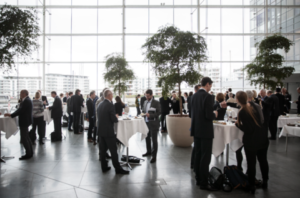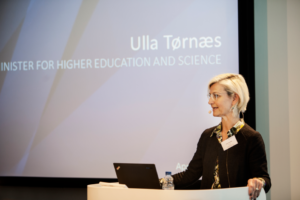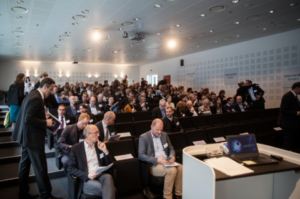Denmark’s Science Minister: more knowledge is required on the impact of research
What is the socioeconomic impact of investing in research? How can this be measured optimally?
These were the topics of a conference in Hellerup, Denmark attended by 150 representatives from higher education, the business community, interest groups and politicians, including Ulla Tørnæs, Denmark’s Minister for Higher Education and Science. The conference launched the publication of a new report from the Novo Nordisk Foundation: The economics of research – three socioeconomic impact assessments of investing in research in Denmark.
The report shows that public investment in research positively affects the economy and creates jobs.
Ulla Tørnæs was pleased that the report highlighted the benefits of investing in research.
“Research certainly seems to influence growth and affluence in society. It also provides major benefits. I agree with the Novo Nordisk Foundation and the other participants today that we have insufficient knowledge about the impact of our investment in research. I am therefore very pleased about the three impact assessments presented today. These indicate what we expected and hoped for: that there are positive links between investing in public research, companies’ own investment in research, economic growth and researchers from abroad choosing to work in Denmark,” said Ulla Tørnæs.
“Denmark has a strong position as a knowledge-based society, and protecting our position requires that we continue investing. We need independent research and strategic research, and we also need basic research and application-oriented research,” said Ulla Tørnæs.
No easy answer
Nevertheless, the question of which type of investment in research has the greatest impact is not easy to answer. This was the conclusion of Steve Wooding, Senior Research Leader at RAND Europe in Cambridge, United Kingdom, one of the three keynote speakers.
“It isn’t always the size of the grant or the scientific excellence of the researchers that is decisive for the impact achieved. Much depends on other skills of the researchers as well,” he said.
“What is important depends on what you are trying to achieve. If you are looking for impact on society, it is important that you support researchers that can bridge boundaries and network with other stakeholders and converse with the appropriate community.”
Steven Wooding has carried out research on the impact of research within the life sciences over the past 25 years. He points to the importance of international collaboration as one element.
“Our studies show that the best researchers who have great impact are also the ones who collaborate internationally. This suggests that, if you are supporting excellent researchers, you should provide them with the opportunity to reach out to the rest of the world.”
New research programme
During the conference, the Novo Nordisk Foundation also presented a new social science research programme that will provide additional knowledge on the importance of research for society. This pleased Ulla Tørnæs.
“Through education and research, we set the framework for how society will develop,” said Ulla Tørnæs.
“In the coming years, I look forward to us obtaining even more knowledge about the impact of our investment in research. The more we know about this, the more businesses such as Novo, Grundfos and Epitherapeutics we can launch,” concluded the Ulla Tørnæs.


“Research makes us smarter and improves our lives. It also provides jobs, growth and affluence. It is valuable for both individuals and for society as a whole,” said Ulla Tørnæs, Denmark’s Minister for Higher Education and Science, during the conference hosted by the Novo Nordisk Foundation yesterday.


